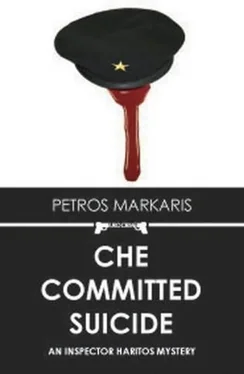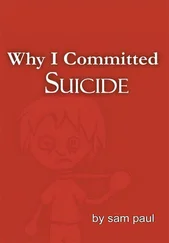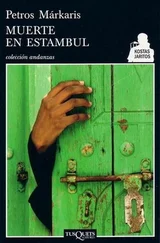I waited for the song to end in the hope that some explanation or message would be forthcoming, but all that followed was silence. There was nothing else on the CD. Zissis had fallen silent, too. His eyes were still filled with tears. I’ve said it before, I’m not very good at expressing my feelings. That’s why I preferred to fast-forward and come straight to the point.
‘Make anything of it?’ I asked him.
He got up without saying anything and went out of the room. I suspected that something had flashed through his mind, but I knew I would have to be patient and go along at his pace. Before long he came back holding a small card covered in scribbles. Because I had seen cards like that before at his house, I knew that it was from his secret archive and I waited.
‘Favieros, Stefanakos and Vakirtzis claimed that, politically, they belonged to the left but that they were not members of any particular leftist party.’ He stopped and twisted the card in his fingers. ‘But they were only telling half the truth. It’s true they didn’t belong to any party, but they were members of a group.’
‘Which group?’
‘A group that called itself the Che Independent Resistance Organisation. When you gave me the T-shirt I didn’t think of that straightaway, but the song brought it back to me.’ He heaved a sigh and said, as though to himself: ‘Songs always take you back. They did then and they do now.’
I understood what he meant, but I preferred not to make any comment. I let him go at his own pace, even though I was sitting on hot coals.
‘Don’t imagine it as being any big or important group. At most it had about ten members. But they believed in armed resistance. Not that they ruled out other kinds of struggle: gatherings, occupations, demonstrations. But they believed that in order for all these to be more effective, they had to be backed by armed resistance. I don’t know whether they ever actually planted bombs or whether they remained at the planning stage, like lots of groups did then. At some stage, the Military Police announced that they had broken up the “Che” ring of terrorist bombers. Of course, that doesn’t mean that they had actually planted any bombs. In those days they arrested you on suspicion, and then they tortured you until you confessed what they wanted to hear.’ He paused and added meaningfully: ‘You of all people should know that.’
Whenever he came out with a dig about my police careeer, I automatically defended myself.
‘I didn’t have anything to do with the Military Police,’ I said coldly.
‘You don’t have to tell me that! Neither did I. It was your lot on the Force that I had to do with! Do you want me to show you how they left my body? It’s all your lot’s work!’
I fell silent and waited for the storm to pass. I knew that if I aggravated him, the conversation would take a different course and I still hadn’t got what I wanted out of him. And, true enough, after a few moments, his tone changed and calmly he said to me: ‘I’m talking about your predecessors. I don’t put you in that category.’
He said that because when he had been locked up in the cells in Bouboulinas Street, and I was just beginning my career then as a guard, I used to let him out of his cell late at night to stretch his legs or have a smoke and warm his clothes on the radiator after he’d been left fully clothed in cold water for hours.
‘Do you know who else was in the group?’ I asked to bring the conversation back to the topic that interested me.
‘I know of three, but there may have been more.’ He gazed at his card. ‘Stellios Dimou, Anestis Tellopoulos and Vassos Zikas. But I can’t tell you where they are, or whether they’re alive or dead.’
I took out my little ringed notebook and noted down the names.
‘The only one of them who’s dead for sure is the organisation’s mastermind,’ Zissis went on. ‘He must have started it on his own initiative and then recruited the others. It seems the Military Police thought the same way too, as he was tortured more than the others. The younger ones called him “uncle” because when the Junta came to power in ’67, he must have already been about forty-five. In other words, around twenty-five years older than they were. After the fall of the Junta, he disappeared and nothing was ever heard of him again. About a year ago, I learned quite by chance that he’d died.’
‘Give me his name so I can note it down with the others.’
‘Thanos Yannelis’
I clutched at my notebook to stop it falling from my hands. What connection might there have been between Thanos Yannelis and Coralia Yannelis? Was it simply a coincidence? If Yannelis had still been alive, he would have been over seventy-five. So Coralia couldn’t be his sister. Perhaps she was his daughter?
‘Do you know whether Yannelis had a daughter?’
‘You never stop, do you!’ he shouted, indignantly. ‘You’re not satisfied with the information I give you, now you want his family tree. No, I’ve no idea whether he had any kids, or any pets for that matter!’
I suddenly remembered all the women in their fifties who worked at Favieros’s companies and something that I’d said to Koula: that Favieros had known them all from his years in the resistance and that’s why he had hired them. If Coralia Yannelis belonged to that category, then it was certain that she was related in some way to Thanos Yannelis.
As I was getting up to leave, he threw the T-shirt to me. ‘Take it, I don’t want it,’ he said. ‘But is it all right if I keep the song?’
‘Keep it, if you want.’ Besides, it wasn’t as if it were evidence in a murder enquiry.
‘Thanks, Lambros,’ I said, while putting the T-shirt back into the plastic bag. ‘I know you can’t stomach coppers, but you’re always a big help to me and I’m grateful.’
He avoided having to answer by lighting up a cigarette. When I was out on the balcony, however, I heard him say behind me: ‘Ah, you coppers. We used to despise all your people when they had money to burn. Now our people have turned the revolution into T-shirts. And everybody’s profited.’
My first thought was to go straight to the offices of Balkan Prospect and speak with Coralia Yannelis. That thought, coupled with my impatience, filled me with momentum till I turned into Alexandras Avenue. From there, however, I began to have my doubts, which increased in direct proportion to the uphill slope. What would I gain by going to Yannelis unprepared? First of all, I wasn’t sure whether she was at all related to Thanos. It could simply be a coincidence. Secondly, even if they were related, I didn’t know how closely. They may have been cousins three times removed who hadn’t seen each other for twenty-five years.
And, apart from Thanos Yannelis, what would happen with the other three? There may even have been other members of the group that Zissis didn’t know about. The correct thing would be for me to investigate, to collect information on Thanos Yannelis and the others and then to confront Coralia. If the other three were alive and living in Greece, they might very well be in danger from Logaras’s suicide mania. And if he’d already been in contact with some of them, we might manage to avert the worst and get some new information on Logaras.
I had got as far as the High Court building when another thought suddenly came to me. Zissis had told me that Thanos Yannelis was dead, but that he didn’t know exactly when he had died. What if Logaras’s first victim wasn’t Favieros but Yannelis? If he, too, had committed suicide, for his own worse luck and ours, then we would have to start looking for a biography. Whatever the case, all this convinced me that I should leave Coralia Yannelis for the time being and collect information on Thanos Yannelis, the other three and any others in the group, if they existed.
Читать дальше












